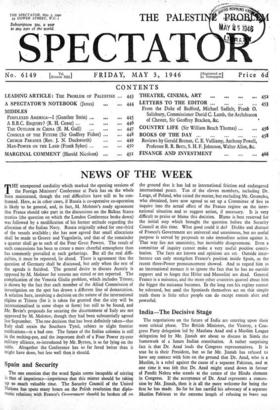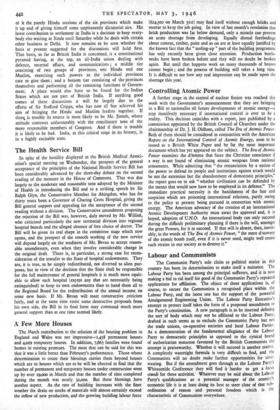India — The Decisive Stage The negotiations on the future of India
are entering upon their most critical phase. The British Ministers, the Viceroy, a Con- gress Party delegation led by Maulana Azad and a Muslim League delegation led by Mr. Jinnah are about to discuss in Simla the framework of a future Indian constitution. A rather surprising fact is that Dr. Azad leads the Congress representatives. It is true he is their President, but so far Mr. Jinnah has refused to have any contact with him on the ground that Dr. Azad, who is a Muslim, is a rebel against the cause of a separate Pakistan, and at one time it was felt that Dr. Azad might stand down in favour of Pandit Nehru who stands at the centre of the Hindu element in Congress. If the acceptance of Dr. Azad represents a conces- sion by Mr. Jinnah, then it is all the more welcome for being the first he has made. So far he has earrie'd his advocacy of a separate Muslim Pakistan to the extreme length of refusing to leave out
of it the purely Hindu sections of the six provinces which make it up and of giving himself some unpleasantly dictatorial airs. His latest contribution to settlement in India is a decision to keep every- body else waiting at Simla until Saturday while he deals with certain other business at Delhi. It now remains to be seen whether the basis at present suggested for the discussions will hold firm. That basis, so far as British India is concerned, is a constitutional pyramid having, at the top, an all-India union dealing with defence, external affairs, and communications ; a middle tier consisting of two groups of provinces, one Hindu and one Muslim, exercising such powers as the individual provinces care to give them ; and a bottom tier consisting of the provinces themselves and performing all the remaining functions of Govern- ment. A place would also have to be found for the Indian States which are not part of British India. If anything good comes of these discussions it will be largely due to the efforts of Sir Stafford Cripps, who has now all but achieved his aim of bringing the Hindu and Muslim leaders together. If therq is trouble its source is most likely to be Mr. Jinnah, whose attitude contrasts unfavourably with the conciliatory tone of the more responsible members of Congress. And if there is trouble it is likely to be bad. India, at this critical stage in its history, is in a highly excitable state.































 Previous page
Previous page